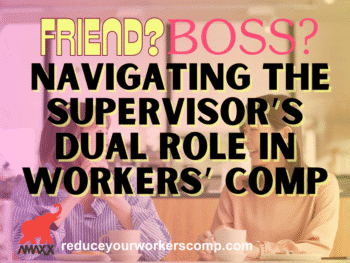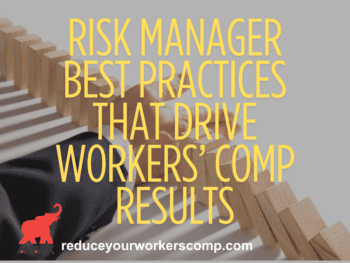
Vital Supervisor Responsibilities
Supervisors play a crucial role in the workers’ compensation process and in responding to work injuries. The supervisor must know what to do to ensure the claim gets pointed in the correct direction following such events. Failure to respond correctly can result in delays and excessive claims costs.
- Educate all employees on post-injury responses and reporting processes;
- Assist all employees suffering from a work injury to receive immediate medical care. Make sure all first aid kits are properly stocked and stored in conspicuous locations;
- Access a telephonic nurse triage service to assess the work injury and best direct medical care;
- Insist on taking the injured employee to a medical facility for post-injury care. If care requires emergency medical services, follow the ambulance to the hospital to serve as a conduit between the treating doctor and employer representatives; and
- Emphasize safety weekly and demonstrate those best practices to all employees – even when no one is watching.
It is also vital that the supervisor ensures the work injury is reported promptly. Supervisors involved in these items can assist the claim team and drive it toward settlement. Now is the time to ensure your supervisors have the tools available to make a difference.
Provide Information Regarding the Work Comp Claim Process
Supervisors also play a vital role in the workers’ compensation claim process. Employees are often confused as to how it works and what to do. Supervisors can help establish trust and confidence by taking the following steps:
- Assist the employee in the claim reporting process. This can include completing and submitting forms to the insurance carrier;
- Provide the employee with contact information for the claim team. This can include the name and contact information for the insurance carrier, the company’s policy number, and ensuring the employee receives a claim number and name of a claim handler;
- Train all employees on what is required of them following a work injury. This can include obtaining copies of medical records, documentation regarding future appointments, and responding to requests for time off work to receive post-injury medical care.
Supervisors should also receive training to assist with return-to-work efforts. There may be other people within an organization the supervisor needs to work with in terms of information regarding the work being performed by the employee, the position’s physical demands, and ideas on transitional work.
Ongoing Work During Injury Recovery
A supervisor’s essential roles and responsibilities do not stop once the injured employee has received medical care and is stabilized. During the acute phase of care and recovery, supervisors must continue supporting the claim team and other interested stakeholders. This requires constant contact and communication with the employee.
- Receive regular updates regarding their medical care and treatment. Obtaining updates on restrictions on the employee’s activity is essential. The supervisors need to be empowered to ask questions and get clarification;
- Communicate with the claim team and upper management regarding return-to-work opportunities. Be creative. Getting the employee back to work reduces money spent on the indemnity portion of a claim and prevents deconditioning;
- Assist in being the “eyes and ears” for signs of malingering.
Providing these duties with empathy and compassion is vital. The supervisor should never criticize or be judgmental regarding their interactions. Simple things like sending a “get well soon” card can establish rapport and communication with the employee.
Conclusions
Supervisors play an important role in controlling workers’ compensation costs and driving claims forward to settlement. For this to occur, upper management needs to empower and train them on the essential responsibilities of what to do following a work injury. Effective supervisors must also play an ongoing role in the process, assist the claim team, and seek creative return-to-work options. Now is the time to involve your supervisors in a post-injury response.

Contact: mstack@reduceyourworkerscomp.com.
Workers’ Comp Roundup Blog: http://blog.reduceyourworkerscomp.com/
©2022 Amaxx LLC. All rights reserved under International Copyright Law.
Do not use this information without independent verification. All state laws vary. You should consult with your insurance broker, attorney, or qualified professional.





























